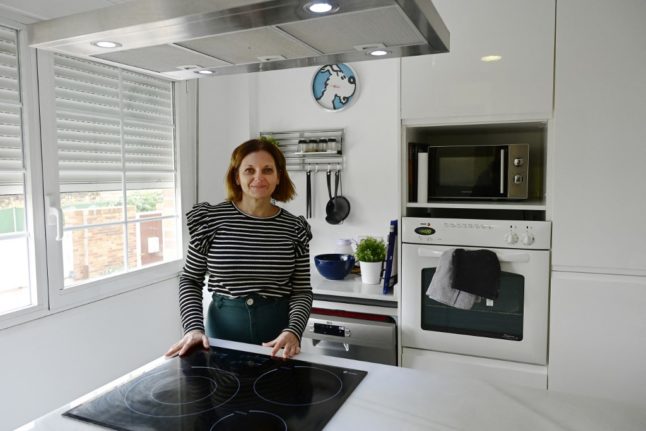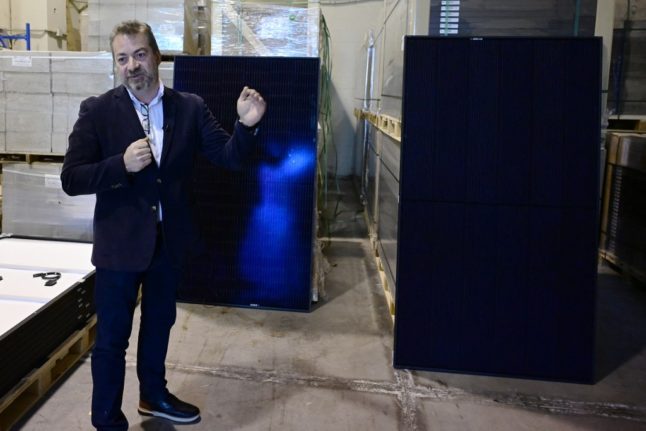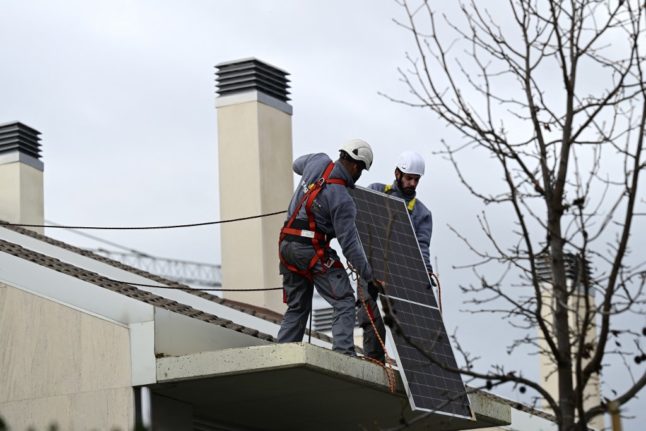“Here we have sun almost all year round,” said Paloma Utrera showing off the black panels installed on her roof in Pozuelo de Alarcon, a well-heeled suburb of western Madrid.
“We need to make the most of it.”
Like many Spaniards in recent months, Utrera has started producing her own electricity after installing 13 photovoltaic panels on her roof with a total output of 4.5 kilowatts.
“It’s not cheap” but with the help of EU and government subsidies, “the savings we’ll make on the electricity bill, the investment isn’t that bad,” she said.
The 50-year-old airline industry employee said she’s halved her electricity bills since having the solar panels installed in September.
“It’s a really worthwhile investment,” said Utrera.
According to Engel Solar, which carried out the installation, rooftop solar panels can generate between 50 and 80 percent of the average household’s electricity needs.
And given the current prices of electricity, that makes for an “interesting” proposal, said Engel Solar commercial director Joaquín Gasca.
Set up in Barcelona in 2005, the company with 200 employees has seen its turnover soar fivefold over the past two years and expects to see a further jump in 2023.
“The phone just never stops ringing, it’s crazy,” said Gasca.

A rooftop investment
And it’s not just individuals.
Businesses and public entities are also getting on board, driven not only by the energy crisis linked to the war in Ukraine but also encouraged by the public funding available through the EU’s vast Covid recovery plan.
All of this has given an unprecedented boost to rooftop solar in the Iberian Peninsula.
“Until about a year ago, if you looked at the rooves in your town or city, you would hardly see any solar panels for self-generation… but that’s totally different now,” said Francisco Valverde, a renewable energy specialist at Menta Energia consultancy.
Jose Donoso, head of Spanish solar power lobby UNEF which groups some 780 businesses, agreed.
“People are seeing how their neighbours are putting in self-generating installations, that they’re happy with them and are saving money, so they themselves are encouraged to get solar panels,” he told AFP.
UNEF says the installed rooftop solar capacity should exceed two gigawatts this year, a figure more than three times higher than in 2020.
Solar power has become “very competitive” with a cost that is “90 percent lower than what it was 14 years ago,” Donoso said.
“People have started realising that their money is better off invested in their rooftops rather than sitting in the bank.”

Democratising energy
For the photovoltaics industry, this resurgence of interest is a welcome development after years in which the sector was left to languish.
As Europe’s sunniest country, Spain was one of the leaders in solar power at the start of the century until the 2008 financial crisis halted the boom.
Since then, it has fallen behind neighbours.
A right-wing government threw shade on the sector by cutting subsidies. It then introducing a tax on households that sold excess electricity to the national grid, a move derided by critics as a “tax on the sun”.
But the tax — which NGOs say was imposed following pressure from energy giants worried about competition from self-generated electricity — was shelved in 2018 when the left came to power and stepped up support for renewable energy.
Since then, the sector has grown rapidly.
Self-generation “democratises energy and takes control away from the big energy corporations that want to retain their hold on power,” Prime Minister Pedro Sanchez said at the end of October.
He predicted between nine to 14 gigawatts of new rooftop solar by 2030, out of a total of nearly 40 gigawatts of new solar power.
In spite of its vast potential, solar energy last year supplied just 9.9 percent of Spain’s electricity — far behind the 23.3 percent generated by wind power, the 20.8 percent provided by nuclear power or the 20.8 percent contributed by natural gas power stations.
Today only “four or five percent” of Spanish homes have solar panels installed, “meaning there is a lot of room for growth,” said Gasca.
It has the potential to be “the leading source of energy” in the Iberian Peninsula, he added.



 Please whitelist us to continue reading.
Please whitelist us to continue reading.
Member comments